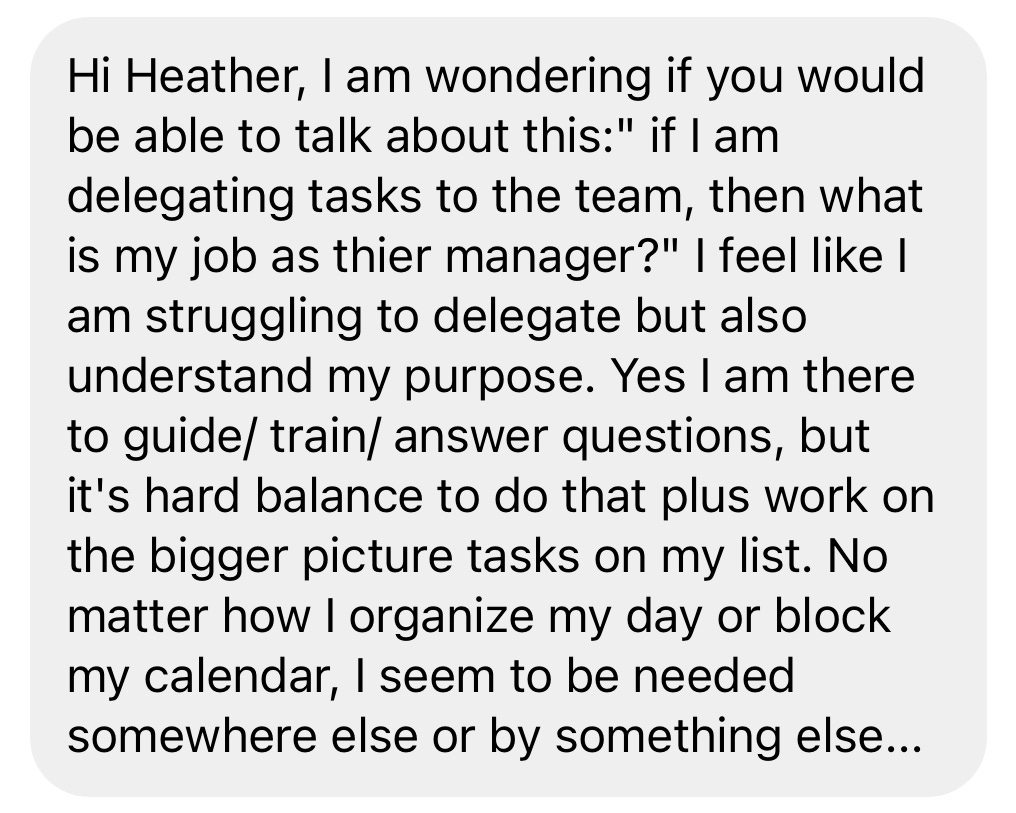"What do great managers actually do all day?"
A week or so ago I got this in my DMs…
It's a valid question. One I had no idea of the answer to when I first started my leadership journey.
But over the years, I have worked alongside some of the greatest managers in the game, from multi-mil £ business builders, the guy who built Microsoft excel (yes, really), and the grads who are being noticed and moved through the ranks right out of uni.
I started learning, writing things down that I’d noticed as patterns, then putting them into practice in my own work.
So here is exactly what you should aim to actually be doing all day:
Spending time with your team 1-on-1
Exactly how much time depends on the size of your team, but you should have scheduled time with each of them at least every other week.
The time should be spent supporting where needed, holding them accountable to their goals and helping them develop themselves as much as possible.
Delegating (properly)
The majority of us managers will spend a lot of our day being handed projects and given direction from above.
Then we often don’t delegate because we think “It’ll just be quicker if I did it myself”
So a reminder, that if done properly, delegation can:
Empower your team member
Ensure the expert is working on the task
Allow your team to grow and be challenged (not just annoyed)
Free you up to work on the rest of the things in this list!
Go to my Instagram post ‘how to delegate properly’
Working on systems
Being a system-focused manager is what sets you head and shoulders above the rest.
It’ll be what ensures you and your team aren’t overwhelmed, and that you’re all working as smart (not hard) as possible.
But what does ‘working on systems’ actually look like?
It means taking time away from the day-to-day technical tasks, to improve the back-end running of the show.
But in simple terms, your systems are the cogs that keep the machine running in the background.
A few of the most important back-end systems I would regularly be working on in my team:
Your people system, or your 1-on-1 system (I’ve done a blog post on that here)
Your accountability system - Aka your KPI meeting rhythms, how they’re run, how you hold people accountable, which KPIs you need to focus on for growth etc.
Your roles and responsibilities across the team - What is everyone working on, are they working to their strengths, should you move resources around?
Values - Spotlighting them in the team (I’ve got an old video on that here)
These are just a few, you’ll have different systems according to your industry (i.e. you might have a CRM software, budgets and finance).
Providing direction
54% of employees believe their managers don't have a clear direction for the team (Harvard Biz Review)
This lack of direction leads to confusion, decreased productivity, and disengagement.
Spend your time ensuring the direction of your team is clear.
Take the goals of the organisation (or set your own team goals), then use your 1-on-1s and meeting rhythms to consistently remind your team of the direction, and hold everyone accountable to it.
Side note for the corporate - If the direction from your seniors is constantly changing, this is where you need to protect your team from the noise. Try to push back on changes in comms until they’re super clear.
Personal Development (for you and your team)
Investing time and $ in the development of you and your team is crucial for long-term success.
A report from Deloitte tells us… Organisations with a strong learning culture are 92% more likely to develop innovative products and processes!!
But the problem is, personal development is always one of those things that sounds great, but gets pushed aside in favour of more ‘urgent’ work.
So it’s your job to put an end to that.
As a manager, you should be spending time identifying areas where your team members can grow, provide training opportunities, encourage skill development, and hold them accountable to personal development.
Reactive work
We need space for being reactive, being given another project from a senior, a team member being ill, deadlines being moved, clients unhappy, whatever happens, you need to have the space to deal with it effectively (as opposed to being super stressed)
You’re either going to love or hate what I’m about to say…
But the greatest managers don’t actually spend all day busy.
And technically, they don’t ‘do’ all that much. They are working ‘on’ instead of ‘doing’.
They aren’t in constant meetings, and they aren’t stressed with a huge to-do list.
They have clear boundaries and disciplines in place over their time (I just did a video on that too).
Drop a comment, I’ve love to hear which one you’re working on first this week
Peace,
H




Beautiful and to the point article! I’ve been insisting on introducing systems to my team, so I’m very happy that you mentioned it here. Will you at some point expand on how to build strong systems?
That last bit is so reassuring to hear you say. It's something I've been wrestling with recently, particularly as me and my team have got on top of a bunch of legacy issues. I'm finding myself able to move much further away from firefighting urgent issues but it is leaving me with a guilty feeling whenever I have full control over my diary - as if I'm "not busy enough".